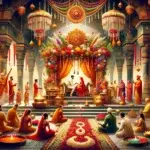Hindu mythology is a rich and complex tapestry of stories, legends, and beliefs that have been passed down through generations. At the heart of Hindu mythology is the Bhagwat Puran, one of the eighteen Mahapuranas, which holds immense importance in Hinduism. This ancient text is revered as a sacred scripture and is considered to be a comprehensive guide to understanding the principles and teachings of Hinduism.
The Origins of Bhagwat Puran
To understand the origins of Bhagwat Puran, one must delve into the roots of Hindu mythology itself. Hindu mythology finds its origins in the Vedas, the oldest scriptures of Hinduism. These ancient texts were composed between 1500 and 500 BCE and contain hymns, rituals, and philosophical teachings. The Vedas were followed by the Upanishads, which are philosophical treatises that explore the nature of reality and the self.
The Structure of Bhagwat Puran
The Bhagwat Puran is divided into ten books, known as Skandhas. Each Skandha focuses on different aspects of Hindu mythology and philosophy. The first Skandha introduces the creation of the universe and the various deities. The subsequent Skandhas delve into stories about Lord Vishnu’s incarnations, with a particular emphasis on Lord Krishna.
Key Characters in Bhagwat Puran
Hindu mythology is replete with a vast array of deities and heroes. The Bhagwat Puran highlights several key characters, including Lord Vishnu and Lord Krishna. Lord Vishnu is considered to be the preserver and protector of the universe, while Lord Krishna is one of his most beloved incarnations. Lord Krishna’s life and teachings are extensively covered in the Bhagwat Puran.
The Role of Karma in Bhagwat Puran
Karma is a central concept in Hindu philosophy and ethics, and it plays a significant role in the Bhagwat Puran. Karma refers to the law of cause and effect, where one’s actions have consequences that determine their future experiences. The Bhagwat Puran emphasizes the importance of performing good deeds and living a righteous life to accumulate positive karma.
The Concept of Reincarnation in Bhagwat Puran
The Bhagwat Puran explores the Hindu belief in reincarnation, which is the cycle of birth, death, and rebirth. According to Hinduism, the soul is eternal and undergoes multiple lifetimes to learn and evolve spiritually. The Bhagwat Puran provides insights into the different realms of existence and the process of liberation from the cycle of reincarnation.
The Significance of Bhakti in Bhagwat Puran
Bhakti, or devotion, is a fundamental aspect of Hinduism, and it holds great significance in the Bhagwat Puran. The text emphasizes the importance of developing a deep and loving relationship with God through devotion and surrender. Bhakti is seen as a path to liberation, as it allows individuals to transcend their ego and merge with the divine.
The Role of Dharma in Bhagwat Puran
Dharma, often translated as righteousness or duty, is a key concept in Hinduism. The Bhagwat Puran highlights the importance of living in accordance with one’s dharma and fulfilling one’s responsibilities towards society, family, and oneself. It emphasizes that leading a righteous life is essential for spiritual growth and attaining moksha, or liberation.
The Symbolism in Bhagwat Puran
Hindu mythology is rich in symbolism, and the Bhagwat Puran is no exception. The text is filled with symbolic representations that carry deeper meanings. For example, the lotus symbolizes purity and spiritual enlightenment, while the conch shell represents the divine sound of creation. Understanding these symbols adds depth and layers of meaning to the stories and teachings in the Bhagwat Puran.
The Lessons of Bhagwat Puran
The Bhagwat Puran offers timeless wisdom and teachings that can be applied to modern life. Its lessons on devotion, righteousness, and the consequences of one’s actions are still relevant today. The text encourages individuals to lead a life of purpose, integrity, and compassion, reminding them of the importance of spiritual growth and self-realization.
The Bhagwat Puran holds immense importance in Hindu culture and beliefs. It provides a comprehensive understanding of Hindu mythology, philosophy, and ethics. The enduring legacy of the Bhagwat Puran lies in its ability to guide individuals on their spiritual journey and offer insights into the nature of reality and the self. By studying this ancient text, one can gain a deeper appreciation for Hinduism and its profound teachings.










